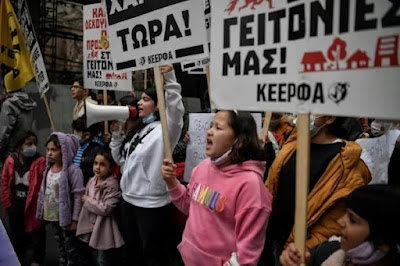Caitlin Taylor, Katie Pedersen, Eric Szeto

The federal government has stopped two separate shipments of goods linked to forced labour from entering Canada — a move that has some advocates pleased but still pushing for more.
A shipment of women's and children's clothing from China was intercepted in Quebec and held by the Canada Border Services Agency (CBSA) sometime between Oct. 11 and Nov. 3.
The clothing was held under a trade tariff that prohibits goods "mined, manufactured or produced wholly or in part by forced labour" from entering Canada.
It marked the first time the federal government has implemented this tariff, which was brought into effect on July 1, 2020, after the ratification of the Canada-United States-Mexico Agreement (CUSMA).
In another move, a major supplier of nitrile gloves to the Canadian government was asked by Public Services and Procurement Canada (PSPC) to cease shipments until the company proves there is no forced labour in its supply chain.
"It's about time," Independent Sen. Julie Miville-Dechêne said of the halted shipments.
She has been fighting for tougher Canadian laws against forced labour and modern slavery for years, introducing transparency legislation around the issue in the Senate.
'Transparency problems'
CBSA would not provide information about which company imported the clothing nor details about the Chinese manufacturer.
"We have to name those companies. We don't know where this merchandise was going to go, and for me, that's a transparency problem," said Miville-Dechêne.
A recent CBC Marketplace investigation found Canadian retailers had brought hundreds of shipments of clothing into Canada from a Chinese factory suspected of secretly using North Korean forced labour.
Malaysian subsidiary has $220M PPE contract
Meanwhile, Supermax Healthcare Canada — a subsidiary of Malaysian glove manufacturer Supermax Corporation — was asked by the federal government to withhold all deliveries until it had passed a social responsibility audit proving that the company doesn't use forced labour.
The audit is already underway and the results are expected in mid-November, said PSPC.
Supermax has come under fire in recent months after a BBC investigation in February revealed many forced labour indicators were present at their Malaysian factories.
In October, U.S. Customs and Border Protection stopped all disposable gloves produced by Supermax Corporation and its subsidiaries from entering that country.
Supermax Healthcare Canada currently has a contract with the federal government valued at more than $222 million to provide Canada nitrile gloves amid the ongoing COVID-19 pandemic.
"That's a big contract," said Andy Hall, a workers' rights advocate based in Asia, who has spoken out for years on the issues migrant glove workers face in Malaysia.
"These purchasing practices are contributing to modern slavery practices in Malaysia."
While Ottawa has paused the shipments that fall under its contract, nitrile gloves from Supermax are still permitted to enter Canada.
Since February, shipping records show that Supermax Healthcare Canada imported more than 370,000 kilograms of nitrile gloves from another company subsidiary, Supermax Global Ltd. (HK) into Canada. The most recent shipment — on Nov. 5 — was for 47,434 kilograms of gloves.
Not doing enough,' advocate says
In a statement, Supermax Healthcare Canada said if the audit substantiates the recent allegations of forced labour, the company will "explore all possible options to address the situation and take swift action to ensure that workers' rights are respected in its supply chain."
Last January, a CBC Marketplace investigation found that several Canadian companies with millions of dollars worth of federal contracts for personal protective equipment (PPE) were connected to imported goods from Malaysian manufacturers with allegations of forced labour in their factories.
Despite these two actions, Hall said the Canadian government should be doing more.
"I see companies that have systemic forced labour issues that are still exporting to Canada," he said
"This has been highlighted to [the Canadian government] and they are not addressing the issue, so I think definitely they are not doing enough."














